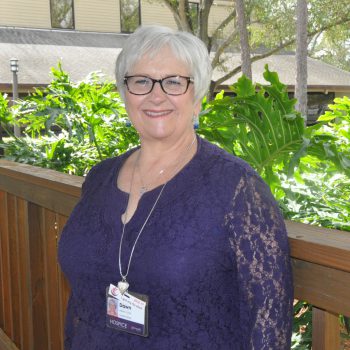
Suncoast Hospice Social Worker Dawn Melvin
As we travel through our lives we inevitably will experience the heartache of a loved one’s death. How do we cope, change and grow after such painful loss and grief?
Once again we will hold The Sacred Art of Living While Grieving group based on the teaching of grief expert Richard Groves. The group will run every Thursday evening for six weeks starting March 7 at our Palm Harbor service center.
During today’s kick-off of National Social Work Month, Suncoast Hospice bereavement social worker Dawn Melvin, LCSW talks about the revival of this special support that she will co-lead with Suncoast Hospice spiritual care coordinator Garth Battick, M.DIV.
Q&A with Dawn Melvin:
1. Why did you bring back this group?
It’s something that I’ve offered on occasion. It’s a different focus than our typical bereavement groups. Richard Groves did a training with us years ago and that’s part of the foundation of the group. I’m thankful that we had that training with him. This is what people struggle with but it’s also hopeful. Garth Battick will provide spiritual support and perspective.
2. Who should attend and why?
It’s open for anyone who has any kind of a loss. It’s geared for all faiths.
If you live any time on this earth, grief will touch you. As we age it touches us more. We want to help people realize that they don’t have to tough it out on their own. There is support available. It’s not an indicator of weakness. It’s an indicator of strength and wisdom to learn more about what they are going through.
3. What will you cover?
I will pull information from The American Book of Living and Dying: Lessons in Healing Spiritual Pain by Henriette Klauser and Richard Groves, and other resources. We will touch on four major components from the book: meaning, forgiveness, relatedness and hope.
There is healing through self-awareness of what gives meaning and purpose to one’s life, which drastically changes when there has been a significant death. Often people wonder, what do I do now? We look at ways to gradually build a different kind of purpose in their life. That may mean reconnecting with their faith community, looking toward volunteer roles, going back to work at a part-time job, connecting with social groups in the area or signing up for a painting class.
There are elements of forgiveness. There may be anger toward a person’s death, family members or God. We look at what forgiveness involves and the benefits of it for our health. Sometimes people need to forgive others and themselves. We also look at guilt and anger and how to deal with those feelings.
Relatedness is about if people have a strong sense of connection with other people that matter to them or if they feel alienated. This can be a challenge, especially for those who were in an extended caregiver role. They may withdraw from golf, bridge or their faith community and after the death occurs, they have to gradually take steps to rebuild. We look at a soulful examination about the time they spend in work, relationships, contemplation, nature and celebration, and if it’s a healthy mix. They may need to realign priorities in order to promote healing.
Finally, there is hope. We see if people are experiencing more hopelessness or feel more hope-filled days. We look at if they still have dreams or if they could begin to develop dreams and hopes now. It may be getting a bike to ride the Pinellas Trail, kayaking or changing the landscape or inside their house. We help people to view dreaming and hopeful behaviors.
Join Us
There’s still time to register for The Sacred Art of Living While Grieving group happening Thursdays, March 7 to April 11 from 6:00 p.m. to 8:00 p.m. in the Volunteer Room at Empath Health Service Center, 2675 Tampa Rd., Palm Harbor. Call to register at (727) 523-3455.

Do you offer anything like this in the south or mid county areas?
Hi Ginger,
We are currently only offering this grief group at our Palm Harbor location. However, we often have grief groups in Mid and South County. Check back with us in case we offer it again and I will forward your inquiry to our bereavement department. Thank you.
Will a group like this be offered again soon?
Hi Michele, Thank you for your inquiry. We have reached out to our community counseling team to see if they will be offering it again. We will let you know as soon as we hear back. Thank you!